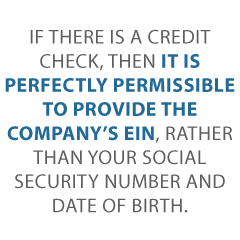Know the New Federal Identification Requirements for Getting Business Loans and Get Funded Faster
New federal identification requirements are going to change everything. And we have the information YOU need, in order to stay in compliance. The is vitally important, so listen up! This is under 31 CFR § 1010.230 – Beneficial ownership requirements for legal entity customers. It is a legal change and it affects you and your business. You are not the exception to this new rule.
May 11, 2018 – The Financial Crimes Enforcement Network (FinCEN) and the US Treasury recently announced that they were implementing a recent law. This new law would require more identification from individuals within businesses which want loans from banks.
Federal Identification Requirements: History
Up until May 11 of the year 2018, banks did not have to know this. They were fine without the names and other details about every owner and principal of a company. A principal would be someone with “control”, such as a CEO. The people under such a definition are:
“A single individual with significant responsibility to control, manage, or direct a legal entity customer, including:
(i) An executive officer or senior manager (e.g., a Chief Executive Officer, Chief Financial Officer, Chief Operating Officer, Managing Member, General Partner, President, Vice President, or Treasurer); or
(ii) Any other individual who regularly performs similar functions.”
Hence before the change, a bank could potentially be granting a loan (and thereby helping to build business credit) without knowing much, if anything about the person requesting the loan.
The potential for mischief had to have been high.
New Federal Identification Requirements
But now banks need to know this information. This requirement exists so long as a person in a company has control. Or if that person must hold 25% of the business or more. So keep in mind, anyone with control does not have to have a 25% ownership interest. In fact, they can own 0% of the business.
However, that is only for new accounts with an opening date of May 11, 2018 or afterwards. Older accounts are fine the way they are. So, do not worry about those.
The people the new regulation targets are the owners and principals of corporations and partnerships.
Sole proprietorships are not going to be unaffected. And the same is true of individuals who do not have business accounts. Employees who do not hold ownership stakes are not affected, either. That is, unless they are in a control position within the organization. Therefore, this can change when someone gets a promotion, or a position of control is filled via external hiring.
New Federal Identification Requirements: Why the Change?
The reasoning for all of this is for anti-money laundering.
Money laundering is a Federal offense. It is essentially means using legit businesses as funnels for illegally-gotten cash and other gains. The concept being money laundering is to cover up the illegal acquisition of cash, stocks, jewelry, etc. by giving it a kind of legal veneer.
This ‘launders’ the money and makes it harder for the authorities to trace the illicit source(s) of the funds. Instead of having extra cash on hand because of a heist, a person looks legitimate because they got their extra funds from a dummy business. See: www.justice.gov/usam/criminal-resource-manual-2101-money-laundering-overview
Yes, anyone with a conviction for money laundering can end up in Federal prison, in places like Leavenworth, Kansas. For a list of all currently operating Federal prisons, see: https://www.bop.gov/about/facilities/federal_prisons.jspv
New Federal Identification Requirements: The Patriot Act
Under the Patriot Act, banks must keep records on transactions done by all entities. These are business entities they recognize, such as corporations and the like.
These new identification requirements supplement that. They do so by requiring name and Social Security number disclosures for all owners and persons with control.
The Patriot Act records work to make it possible to check transaction history and changes over time. The idea is to see if there are new money sources or destinations which could be suspect.
New Federal Identification Requirements: Creating More Transparency
This new regulation is particularly important in light of the existence of shelf and shell corporations. This is because these corporations might seem to have little or no real activity. But they still could end up as conduits for illegal funds.
As noted above, any ill-gotten gains can pass through a corporation. So this corporation does virtually nothing else but make it look like it is adding legitimacy. A shelf or shell corporation, which does nearly nothing a lot of the time, would seem to be a perfect fit for such shenanigans.
One theory behind these new federal identification requirements is:
“…legal entities seeking access to financial institutions to disclose identifying information, such as the name, date of birth, and Social Security number of natural persons who own or control them, will make such entities more transparent, and thus less attractive to criminals and those who assist them.”
It Affects Which Lenders?
The changes will affect all covered financial institutions. Hence, they will affect business loan applications to banks, credit unions, mutual funds and the like.
According to Thompson Coburn, all covered financial institutions means:
“…banks, federally insured credit unions, savings associations, corporations organized for international or foreign banking or financial operations, trust banks or trust companies that are federally regulated and subject to an anti-money laundering program requirement, mutual funds, brokers or dealers in securities, futures commission merchants, and introducing brokers in commodities.”
Hence these new regulations will not affect other means of getting money for a business. These other methods include angel investing, venture capital, crowdfunding, and so forth.
Vendor Credit
Note: vendors are exempt, unless the credit ultimately comes from a bank. But for credit directly from a vendor? The law does not apply at this time. Will that change in the future? It is hard to say. But in the meantime, you can leave a form field calling for a Social Security Number blank.
And make sure not to fill in any other number, not even a Credit Privacy Number! Because if you do so, you will have just committed two felonies.
New Federal Identification Requirements: Personal Guarantees and Identification Disclosure
As a result of the changes, lending institutions will be asking for identifying data. So this will be requests from business owners and shareholders with significant holdings. This includes information such as Social Security numbers. It also includes date of birth.
And this is even when a personal guarantee is neither the subject of a request, nor on offer.
Business owners should keep this in mind and ask questions if their Social Security number is the subject of a request. One thing to ask is whether providing an SSN will result in the addition of a personal guarantee. It should not under these new requirements, but it will always pay to check.
Ask now and know for sure; that is a lot better than getting a nasty surprise later.
More Details
This is how it is for any credit from a bank or ultimately from a bank. It is no longer possible to apply for business credit with no Social Security Number. And you can no longer leave that field blank, either. Instead, the new Federal law requires that you provide your Social Security Number and date of birth. Both of these data points are necessary for identification purposes. You cannot get out of providing them.
However, it is important to be cautious. Make absolutely certain the request for these identifiers is to identify you, rather than to have you provide a personal guarantee. When it is time to talk guarantees, you should be providing your business’s EIN.
In addition, if there is a credit check, then it is perfectly permissible to provide the company’s EIN, rather than your Social Security Number and date of birth.
Here is How Credit Suite Can Help
It is our mission here at Credit Suite to make business credit building easy and intuitive for small business owners. We are dedicated to helping entrepreneurs obtain business credit, loans, and credit lines to start and grow. These new regulations open up a world of transparency in financial dealings.
For everyone on the right side of the law, they are a mere bump in the road for getting business credit and loans.
Our job is to help business owners understand when and why a request for their Social Security number comes under these regulations. And we can also help business owners understand when it is for a personal guarantee.
Contact us today to learn more about the new Federal regulations and identification requirements.

